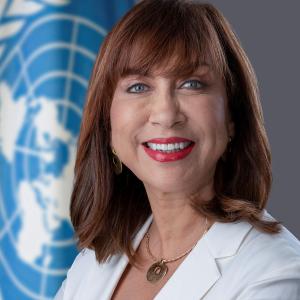UN and Humanitarian Partners Mobilize Response to Support Flood-Stricken Communities in Nepal’s Climate Crisis
08 October 2024
Kathmandu, 8 October: The UN and the humanitarian country team is today setting out an urgent plan to support the ongoing efforts of the Government of Nepal to respond to the deadly floods and landslides that struck Nepal from 27-28 September.
The Nepal Floods Response Plan prioritizes 193,000 people, with an immediate funding requirement of US$ 17.5 million to provide urgent assistance to the most vulnerable and most affected people and communities.
With 246 fatalities, 183 injuries, and 18 individuals still missing, the floods have caused widespread devastation in 21 districts, seven of which have been severely impacted. Thousands of families have been displaced, with over 10,000 households sheltering in overcrowded temporary camps, struggling to access basic needs like clean water, sanitation, and healthcare. Damage assessments reveal extensive destruction of critical infrastructure, including roads, bridges, health facilities, and schools, as well as significant losses in agriculture and energy sectors.
“Families and communities in Nepal are reeling from devastating floods and landslides that have compounded existing vulnerabilities to disasters and climate shocks. This response plan is a unified commitment of the Humanitarian Country Team to provide lifesaving assistance to the communities who need and deserve our support to face the devastating consequences of the global climate crisis. We need to stand by them as we globally face a very real, yet uncertain, climate future” said Ms. Hanaa Singer-Hamdy, UN Resident Coordinator in Nepal.
The Nepal Floods Response Plan supports the government's "build-back-better" strategy, focusing on urgent food, water, shelter, and protection needs. It prioritizes vulnerable groups—women, children, the elderly, and people with disabilities—ensuring equitable access and addressing risks like disease, protection issues, and food insecurity.
Donor support towards the US$17.5 million urgently required through this plan would ensure UN agencies and humanitarian organizations are capacitated to fully support the people and Government of Nepal.
As the floods developed on 29 September, the Central Emergency Response Fund (CERF) triggered US$3.4 million for Anticipatory Action (AA) in Sunsari and Saptari districts, prioritizing vulnerable populations in Koshi and Madhesh provinces. This anticipatory approach, piloted and implemented by FAO, UNFPA, UNICEF, and WFP, is a vital effort to safeguard lives and livelihoods in flood- affected communities.
In close collaboration with the Government of Nepal, the Humanitarian Country Team, UN agencies and partners will intensify efforts to provide life-saving relief and restore livelihoods, ensuring communities have the resilience to rebuild in the wake of yet another climate-driven disaster.
#
For Further Information contact:
Simrika Sharma
National Information Officer
Email: simrika.sharma@un.org
Tel: +977 5523200 Ext. 1510

Hanaa Singer-Hamdy
Prior to this, she held several senior management positions in UNICEF offices across the world, including as the Associate Regional Director in Geneva and as Country Representative for Syria, Nepal, Kazakhstan and Azerbaijan.
In Syria, she provided strategic leadership to one of the largest protection crises on the global stage – successfully scaling up programmes through an integrated package of high impact interventions in health, nutrition, water and sanitation, education and child protection - increasing the reach of UNICEF’s work to the most vulnerable children including in besieged and hard-to-reach areas.
As UNICEF Chief in Nepal, she pioneered strategic programmes for scaling up sanitation, adolescents and multisectoral nutrition programmes, establishing strategic new alliances resulting in the government adopting national action plans. She has also led humanitarian programmes in Burundi and Haiti, and as a regional emergency advisor for CEE/CIS countries coordinated setting up cross border humanitarian operations to Afghanistan ,from central Asia, and Iraq,from south Turkey. She also provided technical support to emergency preparedness programmes in the North Caucasus, CEE/CIS countries .
Ms. Singer-Hamdy holds a Master's degree in Political Sociology and a Bachelor's degree in Political Science from the American University in Cairo, Egypt. She obtained a diploma in “Planning and Management of Decentralized Development Projects” from Bradford University in the United Kingdom. Ms. Singer-Hamdy has engaged in academia and research in political sociology and international relations at the American University of Cairo and at the Sadat’s Academy for Management Sciences, Faculty of Political Science of Cairo University.









